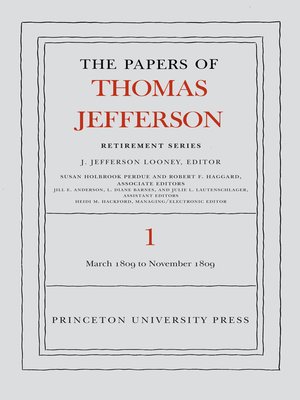The Papers of Thomas Jefferson, Retirement Series, Volume 1
ebook ∣ 4 March 1809 to 15 November 1809 · Papers of Thomas Jefferson: Retirement Series
By Thomas Jefferson

Sign up to save your library
With an OverDrive account, you can save your favorite libraries for at-a-glance information about availability. Find out more about OverDrive accounts.
Find this title in Libby, the library reading app by OverDrive.



Search for a digital library with this title
Title found at these libraries:
| Library Name | Distance |
|---|---|
| Loading... |
This volume inaugurates the definitive edition of papers from Thomas Jefferson's retirement. As the volume opens, a new president is installed and Jefferson is anticipating his return to Virginia, where he will pursue a fascinating range of personal and intellectual activities. He prepares for his final departure from Washington by settling accounts and borrowing to pay his creditors. At Monticello he tells of his efforts to restore order at his mismanaged mill complex, breed merino sheep, and otherwise resume full control of his financial and agricultural affairs.
Though he is entering retirement, he still has one foot firmly planted in the world of public affairs. He acknowledges a flood of accolades on his retirement and has frequent exchanges with President James Madison. While fielding written requests for money, favors, and advice from a kaleidoscopic array of relatives, acquaintances, strangers, cranks, anonymous writers, and a blackmailer, he maintains a wide and varied correspondence with scientists and scholars on both sides of the Atlantic.
The volume's highlights include first-hand accounts of Jefferson's demeanor at his successor's inauguration and one of the most detailed descriptions of life at Monticello by a visitor; Jefferson's recommendations on book purchases to a literary club and a teacher; chemical analyses of tobacco by a French scientist that first isolated nicotine; the earliest descriptions of the death of Meriwether Lewis; one of Jefferson's most eloquent calls for religious tolerance; and his modest assessment of the value of his writings in reply to a printer interested in publishing them.







